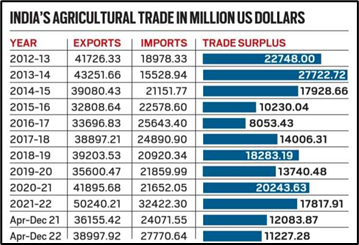Why in news?
- India’s agri-exports are on course to cross a new high, but easing world prices may dampen prospects.
What’s in today’s article?
- India’s Latest Farm Exports
- About Farm Imports
- Government Initiatives to Promote Agricultural Exports
India’s Latest Farm Exports:
- Government data show the value of farm exports in April-December (9 months) 2022, at USD 39 billion.
- This is 7.9% higher than the USD 36.2 billion for the corresponding period of the previous year.
- At this rate, the record USD 50.2 billion exports achieved in 2021-22 look set to be surpassed.
- Key Factors behind the increase in Exports –
- The two big contributors to India’s agri-export growth have been rice and sugar.
- India in 2021-22 shipped out an all-time-high 21.21 million tonnes (mt) of rice valued at USD 9.66 billion.
- Sugar exports hit a record value of USD 4.60 billion in 2021-22, as against USD 2.79 billion, USD 1.97 billion, USD 1.36 billion, and USD 810.90 million in the preceding four fiscals.
- This fiscal has seen a further surge of 43.6%, from USD 2.78 billion in April-December 2021 to USD 3.99 billion in April-December 2022.
- The exports of rice and sugar are well on course to touch, if not top, $11 billion and $6 billion respectively in 2022-23.
About Farm Imports:
- Similar to exports, the imports are also growing.
- The imports of agri produce stood at USD 27.8 bn in Apr-Dec 2022.
- This is a growth of 15.4% over the USD 24.1 bn for Apr-Dec 2021.
- As a result, there has been a further shrinking of the surplus on the farm trade account.

- The growth in imports has come mainly from three commodities –
- The first is vegetable oils, whose imports shot up from USD 11.09 bn in 2020-21 to USD 18.99 bn in 2021-22.
- The other three commodities are cotton, cashew and spices.
- Key Factors behind the increase in Exports –
- India’s cotton production has declined from 398 lakh bales in 2013-14 to a 12-year low of 307.05 lakh bales in 2021-22.
- The effects of not allowing new genetic modification (GM) technologies after the first-generation Bt cotton are showing, and impacting exports as well.
- A proactive approach is required in edible oils as well, where planting of GM hybrid mustard has been permitted with great reluctance.
Government Initiatives to Promote Agricultural Exports:
- Promotion of exports of agricultural products is a continuous process.
- To promote agricultural exports, the Government has taken several steps at State/District levels.
- Agriculture Export Policy 2018 –
- In order to boost farm exports, the Government introduced a comprehensive Agriculture Export Policy in 2018, with the following objectives –
- To diversify our export basket, destinations and boost high-value and value-added agricultural exports including focus on perishables.
- To promote novel, indigenous, organic, ethnic, traditional and non-traditional agri products exports.
- To provide an institutional mechanism for pursuing market access, tackling barriers and deal with sanitary and phytosanitary issues.
- To strive to double India's share in world agri exports by integrating with global value chain at the earliest.
- To enable farmers to get benefit of export opportunities in overseas market.
- District as Export Hub Initiative –
- Under this initiative, products including agricultural products with export potential have been identified in all 733 districts across the country.
- Transport and Marketing Assistance for Specified Agriculture Products –
- It is a Central Sector Scheme.
- It aims at providing assistance for the international component of freight to mitigate the freight disadvantage for the export of agriculture products.
- Besides, Product specific Export Promotion Forums (EPF) for eight high potential agri products i.e., Grapes, Mango, Banana, Onion, Rice, Nutri-Cereals, Pomegranate, Floriculture & Plant material have been created.










